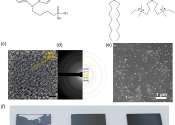Researchers realizing the limitless possibilities of wearable electronics
Benoît Lessard and his team are developing carbon-based technologies which could lead to improved flexible phone displays, make robotic skin more sensitive and allow for wearable electronics that could monitor the physical ...
Jan 27, 2021
1
42









